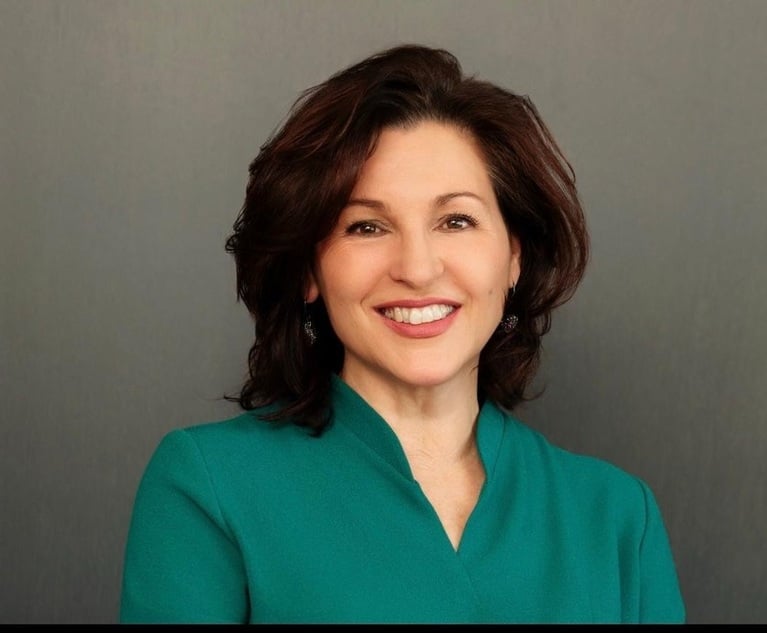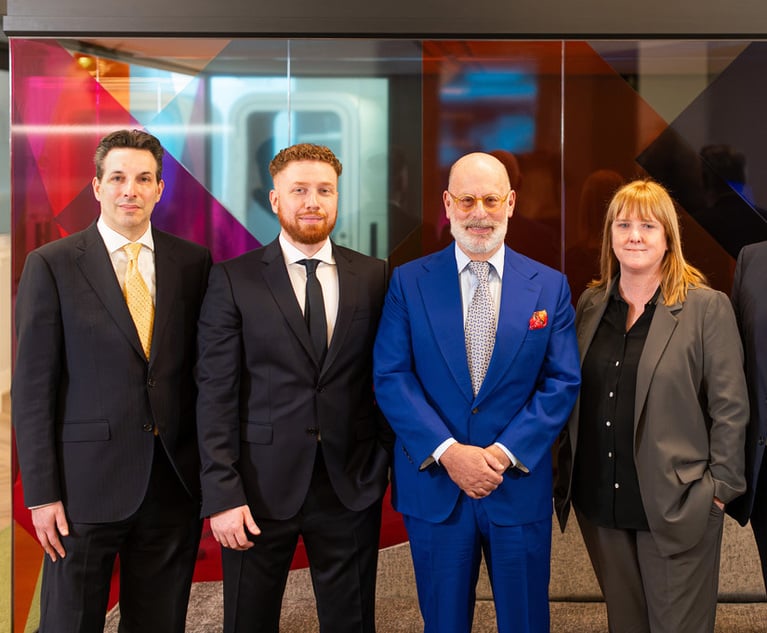Allegations Against Burford Could Muddy the Waters for Litigation Funding, Law Experts Argue
Some legal experts argue the litigation funding industry is poised for change after the Burford-Muddy Waters showdown.
August 14, 2019 at 03:50 PM
6 minute read
The original version of this story was published on Law.com
 Screenshot of Burdford Capital's website.
Screenshot of Burdford Capital's website.
The law community has had about a week to digest the accusations ping-ponging between Burford Capital and San Francisco-based investment firm Muddy Waters, and legal experts remain divided about the facts and impacts of the exchange. However, some argue the litigation funding industry might not look the same in the aftermath.
Last week, Muddy Waters published a report calling Burford "arguably insolvent" and accused the litigation funder of manipulating its metrics for gauging financial returns. The next day, Burford issued a scathing rebuttal and hosted a lengthy shareholder call, slamming the report as false and misleading. On Sunday, Burford officially accused Muddy Waters of market manipulation. The Rosen Law Firm in New York is investigating the allegation on behalf of shareholders, and Freshfields Bruckhaus Deringer, Quinn Emanuel Urquhart & Sullivan and Morrison & Foerster are advising Burford.
The back-and-forth continued on Tuesday, with Muddy Waters ripping into Burford's response.
"Leave it to former trial lawyers to talk so much, and yet say so little," Muddy Waters said in a statement. "BUR's written response and numbing two-hour call did nothing to dispel our view that BUR a) aggressively marks its cases up to generate non-cash profits, b) manipulates its … metrics in order to justify its fair value gains, c) deliberately confuses investors about the extent of its fair value gains in each period, and d) has a fragile balance sheet with too much leverage, particularly given the excessive costs the business runs (of which a significant portion could be management compensation)."
Muddy Waters did not stop there. The company also likened Burford to disgraced commodity traders Enron and Noble Group.
"Moreover, we believe BUR is effectively sprinting on a treadmill whereby it is growing its portfolio aggressively not because there are so many great opportunities; but, rather because it has so aggressively taken fair value gains that sap the business of future earnings power, and it therefore needs to add litigation assets to the balance sheet in order to take more fair value gains. In this way, we also see BUR as possessing the same illness that, in our view, brought Enron and Noble Group down: addiction to mark-to-model gains financed by debt. BUR exhibits another characteristic of Enron and Noble Group – baselessly attacking critics in an attempt to distract investors from their own shortcomings."
To cap it off, Muddy Waters said the U.K.'s financial regulator, the Financial Conduct Authority, could have grounds to sanction Burford, and the company is standing by to work with the regulator.
However, some litigation funding experts believe the report comes from a lack of understanding about a complicated industry.
Teddy Baldwin of Steptoe & Johnson in Washington, D.C., said the report reflects some misunderstandings of third-party funding. "As an example, I would not necessarily consider a case concluded after a judgment or an award when the claimant has a right to appeal," Baldwin said. "This is especially true with certain investor-state arbitration cases where the claimant can seek an annulment of the award."
Additionally, Baldwin said funders do not need to win every case to be profitable – or even half of them. "The business model is such that only a portion of the cases need to be won and judgments collected to be profitable," he said. "The growth of third-party funders is evidence of the potential profitability of third-party funding."
However, the industry's growth could be one reason why Burford has had to rely on on about four cases for the bulk of its net realised returns during the last seven years, according to the Muddy Waters report.
In one of his previous papers, Jeremy Kidd, associate professor of law at Mercer University in Macon, Georgia, concluded that it was incorrect to think of litigation funding as leading to waves of new litigation. With likely a small increase in litigation, that would mean funders are moving in to an industry already dominated by lawyers and their contingency fees, Kidd said. "Competition between funders and lawyers would drive profits down, so I guess I'm not too surprised that profits aren't what were expected."
Luke Harrison of Debenhams Ottaway in St Albans, England, agrees that the litigation market has been devalued. "The Muddy Waters reports and the wide-ranging press coverage subsequent to it have probably poured some water on the litigation funding fire that has been raging, which has been attracting large numbers of investors," he said. "I think all it's done is cool down the hype around the litigation funding industry."
Harrison said litigation funding is still a profitable asset class, but the issue highlights something that litigation funders have been well aware of: it's a risky business. Despite the well-known exposure, the lawyer suspects that it's more likely that regulators will descend on the industry after this altercation – even though the issues that have come to light might not be thoroughly dealt with via regulation.
Lisa Rickard, president of the U.S. Chamber Institute for Legal Reform, an outspoken opponent of many litigation funding practices, agrees that regulators are now paying attention.
"These developments underscore our long-held view that the third-party litigation funding industry needs greater oversight and transparency," Rickard said. "Both Congress and the federal judiciary are scrutinising the industry, and regulators at every level should take action in order to protect litigants and innocent investors."
This content has been archived. It is available through our partners, LexisNexis® and Bloomberg Law.
To view this content, please continue to their sites.
Not a Lexis Subscriber?
Subscribe Now
Not a Bloomberg Law Subscriber?
Subscribe Now
NOT FOR REPRINT
© 2025 ALM Global, LLC, All Rights Reserved. Request academic re-use from www.copyright.com. All other uses, submit a request to [email protected]. For more information visit Asset & Logo Licensing.
You Might Like
View All
Hengeler Advises On €7B Baltica 2 Wind Farm Deal Between Ørsted and PGE
2 minute read

A&O Shearman To Lose Another Five Lawyers, Including Madrid Practice Head, to EY
3 minute read
Rosenblatt Breaks Away From RBG, Becomes 40-Strong Standalone Firm
Trending Stories
- 1Uber Files RICO Suit Against Plaintiff-Side Firms Alleging Fraudulent Injury Claims
- 2The Law Firm Disrupted: Scrutinizing the Elephant More Than the Mouse
- 3Inherent Diminished Value Damages Unavailable to 3rd-Party Claimants, Court Says
- 4Pa. Defense Firm Sued by Client Over Ex-Eagles Player's $43.5M Med Mal Win
- 5Losses Mount at Morris Manning, but Departing Ex-Chair Stays Bullish About His Old Firm's Future
Who Got The Work
J. Brugh Lower of Gibbons has entered an appearance for industrial equipment supplier Devco Corporation in a pending trademark infringement lawsuit. The suit, accusing the defendant of selling knock-off Graco products, was filed Dec. 18 in New Jersey District Court by Rivkin Radler on behalf of Graco Inc. and Graco Minnesota. The case, assigned to U.S. District Judge Zahid N. Quraishi, is 3:24-cv-11294, Graco Inc. et al v. Devco Corporation.
Who Got The Work
Rebecca Maller-Stein and Kent A. Yalowitz of Arnold & Porter Kaye Scholer have entered their appearances for Hanaco Venture Capital and its executives, Lior Prosor and David Frankel, in a pending securities lawsuit. The action, filed on Dec. 24 in New York Southern District Court by Zell, Aron & Co. on behalf of Goldeneye Advisors, accuses the defendants of negligently and fraudulently managing the plaintiff's $1 million investment. The case, assigned to U.S. District Judge Vernon S. Broderick, is 1:24-cv-09918, Goldeneye Advisors, LLC v. Hanaco Venture Capital, Ltd. et al.
Who Got The Work
Attorneys from A&O Shearman has stepped in as defense counsel for Toronto-Dominion Bank and other defendants in a pending securities class action. The suit, filed Dec. 11 in New York Southern District Court by Bleichmar Fonti & Auld, accuses the defendants of concealing the bank's 'pervasive' deficiencies in regards to its compliance with the Bank Secrecy Act and the quality of its anti-money laundering controls. The case, assigned to U.S. District Judge Arun Subramanian, is 1:24-cv-09445, Gonzalez v. The Toronto-Dominion Bank et al.
Who Got The Work
Crown Castle International, a Pennsylvania company providing shared communications infrastructure, has turned to Luke D. Wolf of Gordon Rees Scully Mansukhani to fend off a pending breach-of-contract lawsuit. The court action, filed Nov. 25 in Michigan Eastern District Court by Hooper Hathaway PC on behalf of The Town Residences LLC, accuses Crown Castle of failing to transfer approximately $30,000 in utility payments from T-Mobile in breach of a roof-top lease and assignment agreement. The case, assigned to U.S. District Judge Susan K. Declercq, is 2:24-cv-13131, The Town Residences LLC v. T-Mobile US, Inc. et al.
Who Got The Work
Wilfred P. Coronato and Daniel M. Schwartz of McCarter & English have stepped in as defense counsel to Electrolux Home Products Inc. in a pending product liability lawsuit. The court action, filed Nov. 26 in New York Eastern District Court by Poulos Lopiccolo PC and Nagel Rice LLP on behalf of David Stern, alleges that the defendant's refrigerators’ drawers and shelving repeatedly break and fall apart within months after purchase. The case, assigned to U.S. District Judge Joan M. Azrack, is 2:24-cv-08204, Stern v. Electrolux Home Products, Inc.
Featured Firms
Law Offices of Gary Martin Hays & Associates, P.C.
(470) 294-1674
Law Offices of Mark E. Salomone
(857) 444-6468
Smith & Hassler
(713) 739-1250








